

Active GUI element
Static GUI element
Code
WPS object
File/Path
Command line
Entry-field content
[Key combination]
netlabs.org Developers Workshop 2008
Report and Rumors
Formerly self-employed and freelance IT consulant, Thomas now works as a software QA specialist for Sapient.
This year's netlabs.org Developers Workshop took place on May 17 and 18, 2008. The topics discussed in presentations were:
- Voyager
- the future of netlabs.org
- creating installation packages with WarpIN
- problems and solutions regarding WPS development
- access to USB devices
- and general development issues
In addition to the presentations, other topics and rumors were discussed as well, of course. Thomas Klein attended the second day.
The Developer Workshop 2008 took place a while ago and so far nobody has written about it. It is a good opportunity to report some impressions from Düsseldorf and perhaps get the rumor mill working a bit overtime.
I was only there on Sunday [the 18th].
Getting There
I hadn't read all the details—as usual, sigh—and just jetted from Cologne to the youth hostel by car at some point in the morning. Since I work in Düsseldorf almost every day and knew the location of the youth hostel, I naturally hadn't tried to find out about parking facilities. Fortunately, I found a legal parking lot nearby and didn't have to worry about what the fee would be for using the youth hostel's parking lot.
It was also a positive experience to see how easy it can be to use the A57 and A46 highways without traffice jams. When leaving, just take care that it's Sunday and earlier than 9 o'clock. Awesome… I have to remember that… :-)
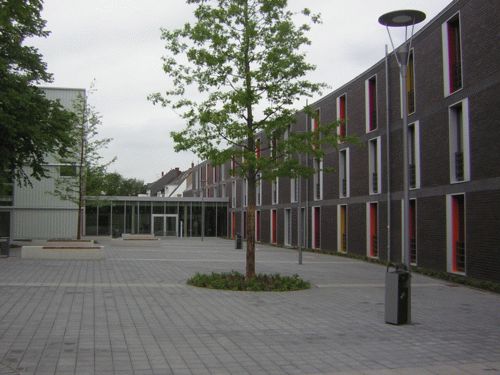
The outside of the youth hostel (Larger image)
From the outside the youth hostel gives a good impression but that is nothing compared to what awaits you after entering the reception area. Wow! I thought I had ended up in some trendy designer hotel of the “Marco Polo Insider Tip” kind.
Being a modern, no-frills, functional, and very spacious youth hostel, it was more than acceptable. The fact that it indeed is a youth hostel may be inferred by the visitors' clothing. One would probably have considered being in a congress center or—as said—“hip” hotel if more suits had been around.
Following my experience from previous Warpstock Europe Workshop's, I first looked for a booth or table with the registration or related signs. Nothing, nada, zilch, zip. But that wasn't all that bad: I saw a familiar face, asked where the Developer Workshop was and off I went. Outside the room on the first floor (where refreshments were already available for the first break) I found a group of the “usual suspects.” In the background I saw that the first presentation was delayed.
So I was on time. Great, nothing missed ;-) and enough time to say “Hello” to everybody.
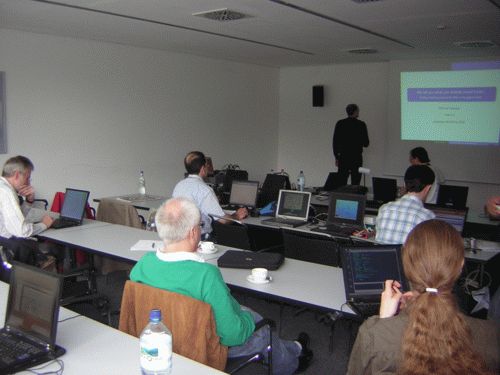
Before the first presentation on Sunday (Voyager status) (Larger image)
Voyager
Adrian provided a short introductory presentation about the project's history—how it had originally started and its motivation. This approach was wisely chosen since the topics included:
- why a shift in the project paradigm had occurred
- where this would lead
- what it means for “us”
Originally, I had planned to discuss the topic completely and explain in detail why I consider the “new Voyager” to be revolutionary and of great technical importance beyond what is OS/2. That would have been too much. So just let me say this: This is about something completely different than desktops and operating systems. It is about “information technology” in the true sense of the phrase.
Combine object orientation and semantics, add interfaces and portability, and the result is a revolution in data processing. I do not exaggerate! (At least not much.) However, one has to invest gray cells to understand the connections and recognize the enormous potential. I don't mean to imply that netlabs.org has invented all this. On the contrary, some of the basics have been there for years. But netlabs.org has managed to see the potential that comes from a skillfully made connection of these parts and is putting it to use and making it “touchable.” And while we are talking about potential, this goes way beyond the borders of OS/2 and operating systems, it is something of fundamental importance for the world of IT itself.
“Okay,” some might ask, “and what is the benefit for OS/2 or eComStation?”
Good question. For OS/2 and eComStation the benefit is: none. Or… maybe it is “everything”… It depends on the perspective. The good thing is that OS/2 and eCS have been on the list of supported platforms from the beginning. And basically noone would ever have developed the idea if it wasn't for IBM's invention called SOM. :-) Besides that, one of the advantages is exactly the fact that it is not something OS/2-specific. Thus more developers could be gotten onboard—last but not least because it is a technologically demanding and platform-independent challenge. More about that now.
Voyager Demo
Bart van Leeuwen took over the interactive “demo” part of Voyager (the “new” Voyager to be exact).
Scenario: Drag the content of a web site about the “Chemical Brothers” (a band) to the desktop using DragText. From the pop-up menu, select Tell me more and a folder with some information resources is displayed that has been created by the system: location, date and times (e.g., for gigs of the current tour), the latest CD of the band (e.g., from a review), or URLs of fan web sites. If you now drag the Date to the Calendar, the gig appointment is entered including date and location. Good. Maybe old hat? How about driving directions? Readily available by dragging the appointment to Google maps (with a corresponding interface). Want to fly instead? Bang, to the site of AirBerlin and there are the flights to the nearest airport for that date. What's their latest CD? I don't know that! One quick drag: Amazon, one click, bought.
This association according to the “meaning” of information is made possible with the help of semantic information about the data and the way of mapping them to objects (or properties). The effort required to create new interfaces and associations is minimized by the characteristics of object orientation. The advantages and transparency of the model are delivered “free to the door.”
Granted, some of the above examples (Amazon, Air Berlin) are completely fictitious at this time, but the core is functional as presented. Of course, quite a bit of fine-tuning regarding stability and easy-of-use is still required. But even the current rudimentary state is very impressive.
Note: Bart's demonstration on the OS/2 desktop was only one implementation of the object model. The model itself is platform-independent. What it boils down to is that the model enables interaction between objects (data + methods) which can be distributed on one or more PCs, USB drives, NAS drives, smart phones, and maybe someday even MP3 players or home entertainment systems.
Coffee break
The coffee was ok and there even was enough milk. ;-) I had gotten hold of a tea water pot on the first try, and the idea of a petition to ISO came to my mind for a globally binding norm for labelling thermos flask content. Okay, one can just use stickers, indelible markers, or signs. But I didn't see any of that.
Anyway, several interesting discussions regarding development and testing methods as well as license models and patents unfolded. One thing I have always admired about Adrian is his ability to take any comment and question “seriously” and be interested in what you tell him, no matter how trivial it may be. Even in the few minutes between presentations he was willing to lend an ear and took the time to answer detailed questions about the licensing of Voyager technology and why netlabs.org had made choosing a license model a priority.
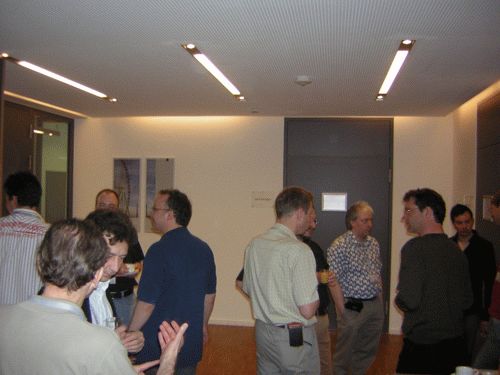
Gathering in front of the presentation room during the coffee break (1) (Larger image)
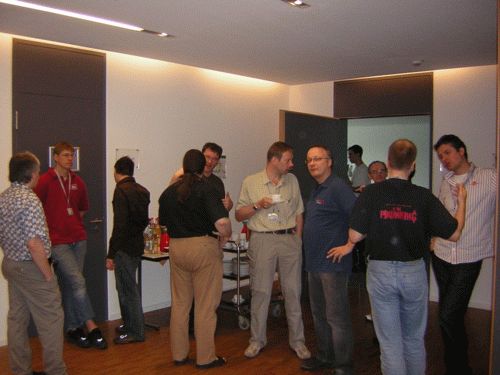
Gathering in front of the presentation room during the coffee break (2) (Larger image)
eCoSoft DevCon
Eugene Gorbunoff was next up discussing what eCo Software offers to developers—at least as I understand it—a presentation of libraries that are available for use and so on. It started in that direction. Eugene explained the current state of driver development, the OS/2 loader, the open-source kernel as well as ACPI and… Errr… what? One moment! What was that? Had he just said “open-source OS/2 kernel”?
People asked for more detail and Eugene insisted that there was an open-source kernel for OS/2. Somebody in—if I remember correctly—Russia seemed to have that. Debug version or not, who knows. However, in spite of all excitement and digging deeper it was impossible to get a clarification or official statement. It also seems that the language barrier was rather high which resulted in people finally dismissing it as a joke.
Things continued in the general direction of a call to all developers to create libraries and give them to eCo Software as a central repository. Well. I then asked if I had misunderstood the topic because that should have been things that eCo Software would provide others. I also wanted to know about support, source code, and documentation for these offerings since that hadn't been covered yet. The reply was that the existing libraries of eCo Software shouldn't actually be used since they weren't really fit. They were more of the technical prototype kind. Ah… yeeess… After that I somehow switched off.
All in all, the presentation was rather poorly structured, the eCo Software strategy was mysterious, and overall confusing. At some point I asked myself what the guy up there in front was actually talking about. Was there anything one could use or not? If yes, what for, how, and what? Eugene voiced the opinion that the libraries of eCo Software couldn't be used because they weren't designed for “large things.” Isn't it my decision as a developer whether I want to use the libraries or not? And, what is the sense in presenting something if you don't want to see it used? I doubt that large numbers of developers are going to knock on Eugene's door and bring heaps of code with them now.
Lunch break
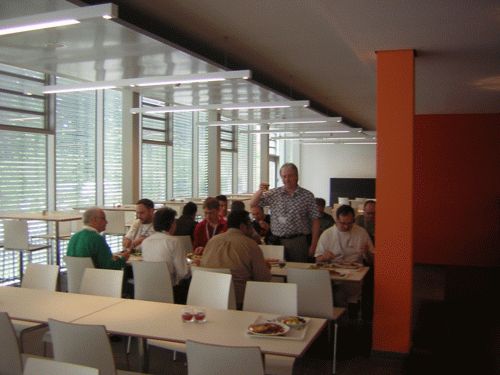
Lunch break in the restaurant. I dunno if the vegetarians got bored since the choice of vegetables was not that large. Cheers, Michael! (Larger image)
For me this was the most interesting part of the day (with the exception of the dessert). The food was ok for the price. I (deliberately) sat myself at the table with Eugene since I wanted to clarify a few things. Also, Roderick Klein (Mensys) and my WSE2006 companion Roland Schmalenberg (Team OS/2 Cologne/Bonn) were there. The result were some interesting news and, of course, rumors. And where could one get the rumor mill working overtime better than near a kitchen… :-).
Rumor has it...
eCo Software
Naturally I wanted to worm some more information out of Eugene. Unfortunately that didn't work in all areas (kernel) but I could at least find out why the “eCo Software libraries” topic had been so strange: Eugene simply doesn't have enough people to test submitted code, develop it further, or offer support. That made me think, “Eugene, why did you make such an ado when there's nothing behind it?” The answer is that this is exactly Eugene's way: provocation, motivation, publication.
eCS 2.0 GA
Wow! Yes, it's coming. Or, to quote Roderick: “There will be no RC6.”
Questioned about an approximate release date, Roderick said, “I refer you to the man to my right who has to give us a stable ACPI … that is the only thing still missing.” To his right sat Eugene.
eCS “EEE Edition”
Roderick said that Mensys was seriously considering publishing an eCS version that would be delivered on a solid state disk for use in an Asus EEE PC. This would be a complete eCS 2.0 (no upgrade) and include all required drivers. I don't want to quote the price that was thrown into the ring because it is subject to change, and I don't want to be the bad guy who reports things wrongly. Anyway, I found the price to be fair for a full version on solid state disk. On the other hand I have to agree with Roland who raised the question why there wouldn't be just a license of a full version for less money.
Serenity—Am I forgetting something?
Things have evolved to a point where Serenity System only acts as the licensor for IBM. Given this, a note to all who loudly cry out to “Serenity” for all things eComStation: Forget it!
Serenity is but a legal front in the relationship to IBM. The actual “soul” behind eCS is definitely Mensys now. I had always wondered how the price for an eCS license was divided up among Mensys, Serenity, and IBM. Or who gets license fees of what amount. Well, whatever the distribution may have been, it is going to change: Rumor has it that Serenity is not the licensee for eCS at IBM anymore but—ta-da!—Mensys, direct, without a “middleman.”
I'd very welcome this should it prove to be true since it would make things clearer: One wouldn't have to wonder who has which role in the game (although that question only had come up regarding Serenity for me). It would also add to Mensys' reputation as, essentially, they are the driving force behind progress in eCS development. Whether this will affect the price of future eCS releases (and when/how), I cannot say. Mensys may not pass on any potential savings to the consumer; nobody forces them to do that and they would make more money with the same product. On the other hand a better price might help increase eComStation's popularity: There are many who think that the relatively high price of a full version of eComStation (compared to Linux distributions or Windows) is an obstacle.
But as I said: Rumor has it…
And then…
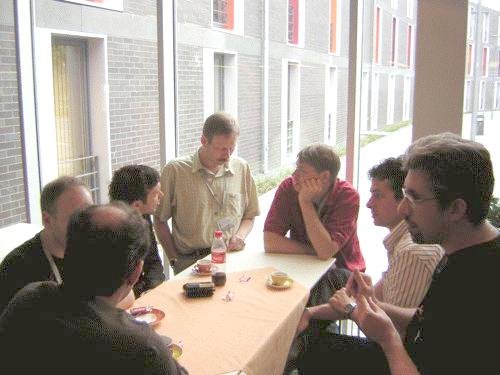
Chat after lunch (1) (Larger image)
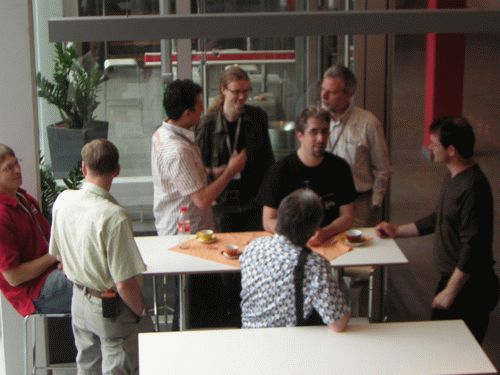
Chat after lunch (2) (Larger image)
Well. After lunch I took some pictures of the youth hostel for the WSE2008 web site, talked to some people again, and then it already was time to go home. I had promised the kids… ;-)





 Feature articles
Feature articles